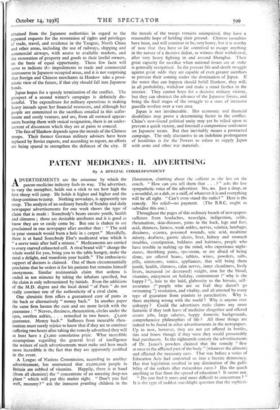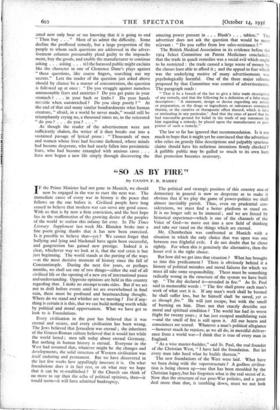PATENT MEDICINES : II. ADVERTISING
By A SPECIAL CORRESPONDENT ADVERTISEMENTS are the antennae by which the patent-medicine industry feels its way. The advertiser, to vary the metaphor, holds out a stick to see how high the first sheep will jump. He holds it higher and higher and the sheep continue to jump. Nothing nowadays, is apparently too steep. The analysis of an ordinary bundle of Sunday and daily newspaper advertisements for one week shows the type of claim that is made : Somebody's beans ensure youth, health and slimness ; those are desirable attributes and it is good fo know they are so easily come by. But one is shaken to see proclaimed in one newspaper after another that : " The acid in your stomach would burn a hole in a carpet." Mercifully, there is at hand Somebody Else's medicated wine which is " a nerve tonic after half a minute." Medicaments are carried to every starved exhausted cell. A rival brand will " change the whole world for. you, bring you to the table hungry, make the meal a delight, and transform your health." The enthusiastic support of doctors is claimed. One of them circumstantially proclaims that he orders it for his patients but remains himself anonymous. Similar testimonials claim that asthma is ended in ten minutes by taking the inhalant specified, but the claim is only substantiated by'initials. Even the additions of the M.D. degree and the local detail " of Paris " do not really convince one of the authenticity of a rival claim.
One altruistic firm offers a guaranteed cure of pains in the back or alternatively " money back." In another paper the same firm hasten the cure and are more lavish with the guarantee : " Nerves, dizziness, rheumatism, circles under the eyes, swollen ankles, . . . remedied in two hours. LI,000 guarantee. Money back." Sufferers from incurable rheu- matism must surely rejoice to know that if they are to continue suffering two hours after taking the remedy advertised they will at least have a LI,000 consolation prize. What incredible assumptions regarding the general level of intelligence the writers of such advertisements must make and how much more incredible is the fact that they are apparently justified in the event.
A League of Nations Commission; according to another advertisement, has announced that 20,000,000 people in Britain are robbed of vitamins. Happily, there is at hand (from all chemists) the " concentrate of an amazing deep-sea plant " which will put this matter right. " Don't you feel well, mummy" ask the innocent prattling children in the illustration, climbing about the sufferer as she lies on the couch. " How can you tell them that . . . ? " asks the low sympathetic voice of the advertiser. No, no. Just a drop, or a mouthful, or a dab, or a sniff, of whatever it is and everything will be all right. " Can't even stand the radio? " Here is the remedy. No relief—no payment. (The B.B.C. ought to subsidise this one.) Throughout the pages of this ordinary bunch of newspapers sufferers from headaches, neuralgia, indigestion, colds, rheumatism, skin-diseases, pains in the back, legs and feet, acid, thinness, fatness, weak ankles, nerves, sciatica, lumbago, dizziness, eczema, poisoned wounds, uric acid, mealtime misery, deafness, gastric ulcers, liver, kidney and stomach troubles, constipation, baldness and hairiness, people who have trouble in making up the mind, who experience night- mares, throbbing pains, eye-strain, or are afraid of being alone, are offered beans, tablets, wines, powders, salts, pills, ointments, tonics, appliances, that will bring them youth, health, slimness, calm nerves, inner cleanliness, lively livers, increased (or decreased) weight, iron for the blood, vitamins, enjoyment on holiday, contentment (" why is she happy ? "), hair to the bald, glabrosity to the hirsute, self- assurance (" people who are so frail they daren't go swimming ") resolution, and vitality, and all attested by every type of guarantor from pianists to parachutists. Why is there anything wrong with the world ? Why is anyone ever unhappy ? Could the advertisers make claims any more fantastic if they took leave of medicine altogether and offered secure jobs, large salaries, happy domestic backgrounds, comprehensive philosophies of life ? All those things are indeed to be found in other advertisements in the newspapers. Up to now, however, they are not yet offered in bottles, tins and boxes though if they were they would presumably find purchasers. In the eighteenth century the advertisements of Dr. James's powders claimed that the remedy " flew at once to afflicted part of the body " (whatever the ailment) and effected the necessary cure. That was before a series of Education Acts had converted us into a literate democracy. Has that legislation resulted in any diminution of the gulli- bility of the seekers after miraculous cures ? Has the quack anything to fear from the spread of education ? It seems not.
" Do you find it more and more difficult to concentrate ? " It is the type of sudden searchlight question that the sophisti- cated now only hear or see knowing that it is going to end " Then buy . . . " Most of us admit the difficulty. Some decline the proffered remedy, but a large proportion of the people to whom such questions are addressed in the adver- tisement columns presumably plead guilty to the impeach- ment, buy the goods, and enable the manufacturer to continue asking . . . asking . . . till the harassed public might exclaim like the character in one of Clemence Dane's plays against " these questions, like coarse fingers, searching out my secrets." Lest the reader of the question just asked above should by chance be a master of concentration, the question is followed up at once : " Do you struggle against nameless unreasonable fears and anxieties ? Do you get pains in your stomach ? . . . in your back or limbs ? Do your hands tremble when outstretched ? Do you sleep poorly ? " At the end of that and many similar bombardments what human creature, " afraid, in a world he never made," would still be triumphantly crying no, a thousand times no, to the reiterated " do you ? . . . do you ? . . . "
As though the reader of the advertisement were not sufficiently shaken, the writer of it then breaks out into a sustained passage of lyrical prose : " Thousands of men and women whose lives had become darkened, whose minds had become desperate, who had nearly fallen into pessimistic fears, who had become entangled with anxious cares . . . have now begun a new life simply through discovering the amazing power present in . . . Blank's . . . tablets." TI- advertiser does not ask the question that would be more relevant : " Do you suffer from low sales-resistance ? "
The British Medical Association in its evidence before the 1914 Select Committee on Patent Medicines concluded ; that the trade in quack remedies was a social evil which ought to be restricted : the trade caused a large waste of money by the classes least able to afford it ; and the appeal to fear which was the underlying motive of many advertisements was psychologically harmful. One of the three major reforms proposed by that Committee was control of advertisements. The paragraph reads :
". That it be a breach of the law to give a false trade description of any remedy, and that the following be a definition of a false trade description : ' A statement, design or device regarding any article or preparation, or the drugs or ingredients or substances contained therein, or the curative or therapeutic effect thereof, which is false or misleading in any particular.' And that the onus of proof that he had reasonable, ground for belief in the truth of any statement by him regarding a remedy, be placed upon the manufacturer or pro- prietor of such a remedy."
The law so far has ignored that recommendation. Is it too much to hope that it might yet be convinced that the advertiser who relies on grossly false descriptions and palpably spurious claims should have his nefarious intentions firmly checked ? A gullible public may be gulled so much to its own hurt that protection becomes necessary.



















































 Previous page
Previous page